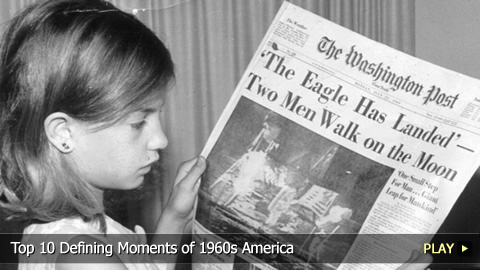Top 10 Defining Moments of 1960s America

It was a revolutionary time in the United States: from sexual revolutions, to wars, to assassinations, the 1960s was full of incidents that changed the direction the United States would take for the rest of the twentieth century. In this video, http://www.WatchMojo.com is counting down our picks for the top 10 defining moments in 1960s America. For this list, we've chosen moments that we felt best represent this essential decade in American history, and that influenced what came next – whether it's the evolution of rock music to increased free speech, greater civil rights to a more cautious foreign policy; the '60s shaped it all.
#10: The Gulf of Tonkin Resolution
August 10, 1964
While social change preoccupied Americans, war raged in Vietnam. The Communist North had South Vietnam on the ropes, and America had little desire to see communism spread. In 1964, a U.S. destroyer was engaged in battle by North Vietnamese naval units. Though the accuracy of these reports was questioned, the Gulf of Tonkin Resolution soon passed, allowing American soldiers to participate in the war. Controversy spread over the necessity of American participation, dividing the country.
#9: Woodstock
August 15-18, 1969
Neglected by a majority that didn’t understand them, the counterculture took solace for three-days in the fields of upstate New York. 1969’s Woodstock Festival combined the liberal ideals of communal living, free love, and open drug use with the innovative rock and soul music of the time. For one weekend, this sect lived happily in peace, free from government interference or ridicule.
#8: Assassinations of Civil Rights Leaders
1965 - 1968
Malcolm X and Martin Luther King, Jr., shared little in common: King was a steadfast devotee to peaceful integration, Malcolm a fiery supporter of black supremacy. Unfortunately, each man was coldly killed at peak popularity. Losing such established leaders left the Civil Rights Movement in dire straits, led by fractured and unorganized groups. It took years to regain the prominence of the early decade.
#7: Cuban Missile Crisis
October 14-28, 1962
With tensions high in the midst of the Cold War, the United States learned of Soviet missiles in Cuba. Something had to be done, so President Kennedy ordered a blockade of the Caribbean nation. For thirteen-days, nuclear warfare seemed all too possible and Americans lived in fear. Fortunately, an agreement was struck for each country to deactivate some of its missiles, and the Cold War’s most dangerous crisis was averted.
#6: 1968 Democratic National Convention
August 26-29, 1968
Tensions came to a head in the summer of ‘68 at the Democratic National Convention. Anti-war protestors rushed to Chicago, only to be greeted by the clubs and mace of aggressive police officers. News stations were quick to capture the footage, transmitting it across the evening news. Young liberals and the counterculture were disgusted, while the older generation found the violence justified. A generation gulf remained.
#5: FDA Approves the Birth Control Pill
1960
First introduced in 1960, the birth control pill kick-started a sexual revolution that swept the nation. Unburdened by the threat of unplanned pregnancies, women were free to pursue higher education and careers, while both sexes experimented with sex and drugs. This gave birth to a counterculture that tested social mores and the limits of American democracy throughout the decade. But this period of peace and love was temporary.
#4: Apollo 11 Lands on the Moon
July 20, 1969
Long before the heartache of the late decade, the U.S. engaged in a frantic Space Race with the Soviet Union. In 1961, President Kennedy boldly declared that America would put a man on the moon before decade’s end. America delivered by sending Apollo 11 in July 1969, taking a decisive lead in the race. The footage of the landing became legendary, and the country’s future looked brighter.
#3: The Tet Offensive
January 30 - September 23, 1968
As 1968 began, the Vietnam War seemed a certain success for America. But this illusion was quickly destroyed. During a holiday cease-fire, Viet Cong soldiers shockingly attacked the South Vietnamese capital, Saigon. Though the invasion was fought off, the harsh truth was obvious: This was no simple war. Troop morale fell, and Americans became disgusted with the war. President Johnson chose not to run for reelection, and the future seemed uncertain.
#2: The Civil Rights Act of 1964
July 2, 1964
Throughout the late-‘50s and early-‘60s, the Civil Rights Movement grew through nonviolent protest and civil disobedience, with events like the March on Washington taking center stage. Long denied their equal rights, African-Americans were finally rewarded through the Civil Rights Act of 1964. Eliminating segregation and biased voting requirements, the act set off a landslide of change that slowly produced equality for minorities.
#1: JFK’s Assassination
November 22, 1963
A young and charismatic leader, John F. Kennedy seemed the perfect president to lead America through the ‘60s. These hopes were shattered when he was shot down by a sniper’s bullet in 1963. Though Lee Harvey Oswald was arrested for the crime, he was murdered before going to trial, leading to endless conspiracy theories over the following decades. Regardless of the motive or perpetrator, President Kennedy’s assassination shook the country and signaled the coming instability.
Do you agree with our list? Which events do you think defined 1960s America and beyond? For more informative top 10s, be sure to subscribe to WatchMojo.com.


 2
2
 0
0
 report
report

 0
0
 0
0
 report
report